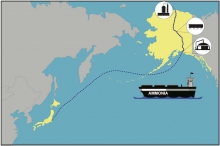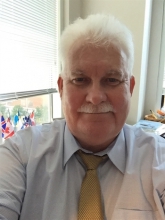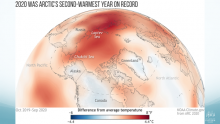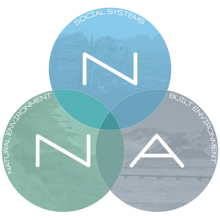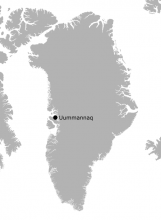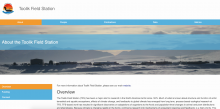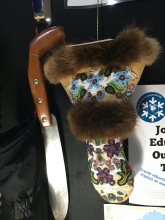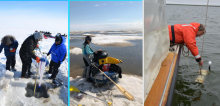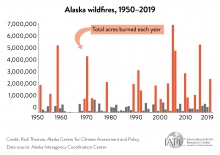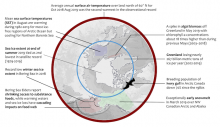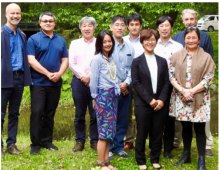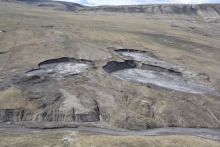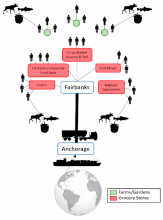Witness Community Highlights is an online publication launched in May 2017 to complement the regular publications of Witness the Arctic. It was developed in response to community feedback identifying the need for a monthly publication to highlight 1–2 Arctic research efforts and other timely items of interest to our readers. Community Highlights is distributed monthly via our Witness the Arctic mailing list of over 8,600 subscribers.
DOE’s Arctic Innovator Fellowship Promotes Technology Projects in Alaska
The US Department of Energy's Arctic Advanced Manufacturing Innovator Program supports fellowships for early career professionals with fresh ideas and innovative approaches to address fundamental hard technology manufacturing challenges. Nathan Prisco, the program's first Innovator Fellow, shares overviews of two technology projects in the Alaskan ecosystem that have potential for broad global impacts.
By: Nathan Prisco, DOE Advanced Manufacturing Office Arctic Innovator Fellow at the University of Alaska Fairbanks
NSF Arctic Sciences Section Head, Simon Stephenson, to Retire
Simon Stephenson, Section Head, Arctic Sciences Section, in the Office of Polar Programs (OPP), will retire at the end of February 2021, concluding an extraordinary decades-long career at the National Science Foundation (NSF). Highlights of his contributions to and support of the research community are highlighted here.
By: Renee D. Crain, Program Officer, Arctic Research Support and Logistics, Office of Polar Programs, National Science Foundation
The 2020 Arctic Report Card
The 15th annual NOAA Arctic Report Card was released on 8 December 2020 as part of the American Geophysical Union 2020 Fall Meeting. The Arctic Report Card, initiated in response to the need for concise and timely Arctic information, serves as a readily available resource for viewing the rapid changes that have engulfed the region. Taken as a whole, the story is unambiguous. The transformation of the Arctic to a warmer, less frozen, and biologically changed region is well underway.
By: Rick Thoman, Climate Specialist with the Alaska Center for Climate Assessment and Policy; and Jacqueline Richter-Menge, Arctic Report Card Editor
NSF's Navigating the New Arctic Program: Projects Funded in 2020
Navigating the New Arctic (NNA), one of NSF's 10 Big Ideas, has supported fundamental convergence research across the social, natural, environmental, engineering, and computing and information sciences since 2017. A wide range of topics and regions is represented in the 21 Arctic research projects that were funded in 2020. This article includes a list of the 2020-funded NNA projects, with brief descriptions.
Editors: ARCUS Staff
Creating Institutional Changes to Improve Indigenous Students' Learning Experiences
Kimberly Kivvaq Pikok shares observations from her experiences as an Indigenous student pursuing a degree in wildlife biology and questions how institutions could change courses and the classroom environment to make everybody feel capable and accepted in their field. As one of the three Arctic Indigenous Scholars selected in 2020, Kimberly will have opportunity to discuss these issues with officials at NSF and other agencies in Washington DC.
By: Kimberly Kivvaq Pikok, Utqiaġvik, Alaska
The Migration in Harmony RCN Investigates the Drivers and Consequences of Arctic Coastal Migrations
Migration in Harmony, a three-year international, cross-disciplinary network funded by NSF, aims to facilitate open communication and build new collaboration teams of scientists, stakeholders, and practitioners to investigate how drivers and consequences of Arctic coastal migrations intersect and interact with one another—and explore the related implications for society.
By: Victoria Herrmann, The Arctic Institute, President and Managing Director
Seasonal Forecasting of Arctic Sea Ice and Atlantic Hurricanes
Accelerated Arctic sea ice melt and increased Atlantic hurricane activity are often quoted as tangible manifestations of ongoing climate change. The desire to improve forecasting capabilities at seasonal time scales has been a primary concern in the respective scientific communities. Fueled by advances in fundamental research on climate predictability and by continued dialogue between the scientific community and stakeholders, expectations can legitimately be high for the years to come.
By: François Massonnet, UCLouvain; Louis-Philippe Caron, Barcelona Supercomputing Center; Philip J. Klotzbach, Colorado State University; Tom J. Philp, London School of Economics; and Julienne Stroeve, National Snow and Ice Data Center and the University of Manitoba.
Inuit Food Sovereignty and Self-Governance — A Healthy Arctic
This Inuit-led research and report, resulting from a three-year co-production of knowledge project, illuminates the unique and rich Inuit values and management practices that have successfully safeguarded the Arctic for thousands of years. The report further links Inuit Food Sovereignty to holistic and adaptive management strategies that can ensure the food security and well-being of Inuit throughout the Arctic for generations to come, along with the health of the entire ecosystem.
Provided by: Carolina Behe on behalf of a nine-member Advisory Committee and over 90 Inuit authors who contributed to the Inuit Circumpolar Council Alaska facilitated Report: Food Sovereignty and Self-Governance: Inuit Role in Managing Marine Resources.
Activity Updates from the Arctic Domain Awareness Center
The Arctic Domain Awareness Center (ADAC), established in 2014 by the U.S. Department of Homeland Security (DHS), Science and Technology's University Programs, provides a scientific basis to address the challenges faced by U.S. Coast Guard (USCG) and other DHS maritime missions in the Arctic region. ADAC investigates capability shortfalls and gaps, and orients research activity to support the USCG mission needs including Arctic search and rescue, humanitarian assistance, disaster response, and security matters.
By: Director Randy "Church" Kee, ADAC Executive Director
Co-Producing Knowledge of Shorefast Ice in Uummannaq Bay, West Greenland
This NSF-funded Navigating the New Arctic project seeks to co-produce knowledge about shorefast ice in the Uummannaq region of West Greenland. As the climate warms, local residents report that the ice is breaking up earlier in the year and is thinner than it was a few decades ago. Combining the latest advances in satellite remote sensing technology with community-based monitoring and local and Indigenous knowledge, researchers aim to understand not only how the shorefast ice has changed but how these changes matter to individuals and communities in the Uummannaq region.
By: Johnny Ryan, postdoctoral researcher in the Institute at Brown for Environment and Society (IBES) at Brown University
Arctic Data Center's New Customizable Portal Service
The new data portal allows users to create a curated collection of datasets from the Arctic Data Center by selecting data based on a particular region, taxa level, or keyword search—or a combination of any number of metadata characteristics present in the metadata of the Center's catalog. These dataset collections, as well as other related information, can be shared widely among a lab group or an interdisciplinary project via a customized URL. Several groups are making effective use of this new service.
By: Erin McLean, Community Engagement and Outreach Coordinator with the Arctic Data Center
US Arctic Research Commission Hosts Virtual Conference and Workshop
The Virtual Conference | COVID-19 Impacts in the Arctic, convened on 19 and 29 May 2020 by the U.S. Arctic Research Commission in partnership with the U.S. Naval War College and the Wilson Center's Polar Institute, hosted 10 moderated panel discussions involving an international group of 46 panelists. Discussion topics ranged from International Arctic Governance, to U.S. Coast Guard Arctic Operations, to the Arctic History of Viral Epidemics and Pandemics. Additionally, the Commission and the Alaska Center for Energy and Power co-hosted a free Virtual Alaska Electric Vehicle (EV) Workshop on 16 and 17 June 2020 to explore the technical and economic potential of EVs in Alaska and the Arctic.
By: Cheryl Rosa, Deputy Director and Anchorage-based Alaska Director of the United States Arctic Research Commission (USARC).
Winter Worlds Project Highlights the Wonders of Snow in Alaska and Beyond
"Our Winter World," is an NSF-funded Informal Science Learning project focused on snow. This outreach project has three components including snow-themed community science nights in Alaskan villages; the design and development of a traveling museum exhibition on snow; and research exploring how cultural background affects learning in museum settings.
By: Matthew Sturm, University of Alaska Fairbanks, Geophysical Institute, et al.
Tracking Alaskan Arctic Changes Through a Collaborative Network of Coastal Indigenous Communities
The Alaska Arctic Observatory & Knowledge Hub (AAOKH) provides sustained long-term observations of shifting environmental conditions in the Arctic. The primary goal of AAOKH is to provide northern Alaska coastal communities with the tools, resources, and scientific support to share their expertise through observations of changing coastal conditions and associated impacts to their access of traditional marine resources. Collectively, local observations provide a broad-scale and synoptic view of changing coastal sea ice and ocean conditions, and ultimately impacts at the community scale.
By: Donna D.W. Hauser, International Arctic Research Center (IARC) at Univ. of Alaska Fairbanks (UAF); Joshua Jones, IARC and the Geophysical Institute at UAF; Robert (Bobby) Puya Schaeffer, AAOKH Observer, Kotzebue, Alaska; Billy Adams, AAOKH Observer, Utqiaġvik, Alaska; Matthew L. Druckenmiller, National Snow and Ice Data Center at Univ. of Colorado Boulder; Roberta Tuurraq Glenn, graduate student at UAF; Elena Bautista Sparrow, IARC and Dept.of Natural Resources and Environment, at UAF; and Hajo Eicken, Director of IARC at UAF.
Long-Term Monitoring Program Sheds Light on High-latitude Landscape Response to Ongoing Warming
The University of Alaska Geophysical Institute Permafrost Laboratory manages an extensive network of permafrost monitoring sites across Alaska, Canada and Siberia. These long-term monitoring sites provide important baseline data that enable the research team to explore how ground temperature responds to ongoing climate change and lead to understanding future landscape response to ongoing warming and the potential implications for both the built and natural environment.
By: Louise Farquharson, Postdoctoral Researcher; Vladimir Romanovsky, Professor of Geophysics; Dmitry Nicolsky, Research Professional; and Alexander Kholodov, Research Associate; Geophysical Institute Permafrost Laboratory, University of Alaska Fairbanks
Indigenous Foods Knowledges Network: Facilitating Exchange between Arctic and Southwest Indigenous Communities on Food and Knowledge Sovereignty
The Indigenous Foods Knowledges Network brings together Indigenous scholars, practitioners, and community members and non-Indigenous scholars to exchange knowledge and experience in support of food sovereignty. Network gatherings include visits to community projects focusing on strengthening and revitalizing traditional foods and the lands and waters that sustain them, and innovating new ways of cultivating or harvesting healthy foods.
By: Noor Johnson, Research Scientist, National Snow and Ice Data Center, University of Colorado Boulder; Mary Beth Jäger, Research Analyst, Native Nations Institute, Udall Center for Studies in Public Policy at the University of Arizona; Lydia Jennings, PhD Candidate, Department of Soil, Water, and Environmental Science, University of Arizona; Amy Juan, Sovereign Remedies, LLC; Stephanie Russo Carroll, Assistant Research Professor, Native Nations Institute, Udall Center for Public Policy and Assistant Professor, Mel and Enid Zuckerman College of Public Health, University of Arizona; and Daniel B. Ferguson, Associate Research Scientist, Institute of the Environment, University of Arizona.
Long-Term Research Addresses Resilience of Beaufort Sea Lagoons
The NSF-funded the Beaufort Lagoon Ecosystems Long Term Ecological Research (BLE LTER) program addresses questions of ecosystem connectivity, stability, and resilience in an environment structured by highly dynamic and seasonally-driven physical forces, over seasonal and multi-decadal time scales, in six lagoons distributed across 500 kilometers of the northern Alaskan coastline.
By: Christina Bonsell, Project Manager, Beaufort Lagoon Ecosystems Long-Term Ecological Research Program
"MicroFEWs": Exploring the Impacts of Local Renewable Energy Projects on Remote Arctic Community Security and Resilience
Food, energy, and water are critical necessities for sustaining community health, well-being, and economic development. Reliance on fuel and energy can place remote Arctic communities in precarious situations where they are vulnerable to fluctuations in prices, energy subsidies, and supplies. The NSF-funded MicroFEWs project aims to explore the impact of local renewable energy projects on FEW security and resilience in the Arctic.
By: Jennifer Schmidt, Assistant Professor of Natural Resources Management and Policy University of Alaska Anchorage and Erin Whitney, Research Faculty, Data Collection and Analysis Program Manager, Solar Technologies Program Manager at the Alaska Center for Energy and Power
Alaska Fire Science Consortium Addresses Management Information Needs
The Arctic and boreal regions saw an active wildland fire season in 2019. In Alaska, wildland fire consumed more than 2.5 million acres, more than half the total acreage burned in the U.S. As climate change affects wildland fire regimes fire and land managers need current, specific, actionable science on a range of issues to support their decision-making. The Alaska Fire Science Consortium is one of 15 regional fire science exchanges supported by the federal Joint Fire Science Program to accelerate the awareness, understanding, and adoption of wildland fire science information by end users.
By: Alison York, Alaska Fire Science Consortium Coordinator
NOAA Arctic Report Card 2019: Brief Summary
Arctic Report Card 2019, an interagency and international publication coordinated by NOAA, was released on 10 December 2019. The peer-reviewed Arctic Report Card provides comprehensive summaries of key land, ice, ocean, and atmosphere observations made throughout the Arctic in the context of historical records and makes clear that Arctic ecosystems and communities are increasingly at risk due to continued warming and declining sea ice.
By: Jacqueline Richter-Menge, University of Alaska Fairbanks, Institute of Northern Engineering, Fairbanks, Alaska; Matthew Druckenmiller, National Snow and Ice Data Center, Boulder, Colorado; and Martin Jeffries, Cold Regions Research and Engineering Laboratory of the Engineer Research and Development Center, U.S. Army Corps of Engineers, Hanover, New Hampshire.
Development of UArctic's Thematic Network on Collaborative Resource Management
There is a growing urgency to learn more about ecosystem change and its impacts in the Arctic. In an effort to better leverage the knowledge of local experts, UArctic has newly established the Thematic Network on Collaborative Resource Management.
This network seeks to develop capacity in collaborative natural resource management and community monitoring in the Arctic and to support community-based approaches to gather information and its use to support management decisions.
By: Olivia A Lee, Assistant Research Professor, International Arctic Research Center, University of Alaska Fairbanks.
The Future Shape of the Greenland Geodetic Network
The Greenland Geodetic Network (GNET) is a series of global navigation satellite system (GNSS) installations located on the bedrock exposed around the perimeter of the island. The network initially aimed at observing the polar regions, predominantly through the use of GNSS and seismologic systems,this network maps vertical and horizontal movement of Greenland, over time, to help improve our understanding of ice-mass changes, allowing scientists to quickly detect and analyze any abrupt changes in the rate of ice loss in this region.
By: Robert Hawley, Associate Professor in Earth Sciences at Dartmouth College and Kelly Brunt, Associate Research Scientist with Earth System Science Interdisciplinary Center at the University of Maryland
Permafrost Discovery Gateway: A New Online Platform Supporting Knowledge-Generation from Big Imagery
The Permafrost Discovery Gateway (PDG), aimed at making big imagery permafrost information accessible and discoverable. New pan-Arctic data products will encompass relevant spatial (down to sub-meter) and temporal scales (down to daily) and provide easy access and discovery of these large datasets through visualization tools accessible through an interactive web browser which will enable knowledge-generation by researchers and the public.
By: Anna K. Liljedahl, Water and Environmental Research Center at the University of Alaska Fairbanks, et al
Widespread Permafrost Degradation in the Canadian High Arctic at 80°N
A recent study in the high Arctic finds widespread and rapid increases in active retrogressive thaw slumps that are a signs of permafrost instability. The study area is a polar desert landscape and is sensitive to small increases in summer air temperatures. Observations indicate that permafrost response to temperature here is complex and, although climate-initiated, terrain factors such as slope may become more important over time in determining slump activity and retreat rates.
By: Melissa Ward Jones, Department of Geography at McGill University
Working for Food Security in Interior Alaska
Reliable food supply is a central concern for residents of cities located in remote locations with extreme climate conditions. In a recent project, researchers examined how stake-holders in such northern cities ensure a high level of food security using a case study of the Fairbanks North Star Borough, Alaska, which is located in the interior of the state near the Arctic Circle. Through that work they hope to develop a prototype of a model that could be applied in other Arctic and near-Arctic cities.
By: Robert Orttung, George Washington University, Washington, D.C.


